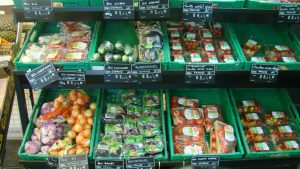Compte-rendu officiel des Concertations pour le Sommet des Nations Unies sur les systèmes alimentaires 2021
Type de Concertation
Coordonnateur
Langue de l'événement de Concertation
Date/heure
À:
Ville
Cible géographique
Format
Veuillez consulter les détails ci-dessous pour obtenir des renseignements sur l’inscription, s’ils sont disponibles, ou communiquer avec le coordonnateur si vous souhaitez y assister.
Description
Future vision
We handle food sustainable on all levels of our supply chain. Food waste is lowered by sensitive marketing, acceptance of “non-standard” vegetables, and a policy framework that leaves freedom for individual decisions and clever business ideas but contributes to lowering food waste.
We become more creative in using our food and leftovers. All children learn how to cook and handle food in a sustainable and healthy way at school. People value food again, also in richer countries.
Startups that see food waste as their business case have become mature prosperous companies with a remarkable impact on the market. Many more young startups follow with new clever ideas, contributing further puzzle pieces for a future with rapidly declining levels of food wastage around the world.
Our challenge
The supply chain is complex, and so are individual and collective decisions: Therefore, it is crucial to sensitize people not just for the environmental and social impacts, but also what they can do about food waste in their own private and professional life.
Question
What strategies for food waste reduction and management need to be implemented during the next five years, and by whom?
In this UN food systems dialogue, we will discuss for example the following topics in groups:
=> We discuss every question for different parts of the supply chain (e.g. farmer, harvest, transportation, processing, supermarket, end-user (e.g. consumer)
- The role of national, regional and international institutions (e.g. government) to promote less food waste
- Food loss vs food waste – how to use more
- The role of consumers themselves vs the role of supermarkets/suppliers and how to interact
- Current food trends and food waste – where are synergies?
- Entrepreneurial experiences – food waste as a business case
- Framing and communications – food waste as a consensual topic
- Challenges in the hospitality sector
- Social perspectives on food waste
- …
Who can join?
Anyone with a stake in the issue and ideas on how to improve food waste management is welcome. It does not matter whether you are a farmer, conscious consumer, student, or business leader – we need all your inputs in order to make a valuable contribution to the World Food Systems Summit Dialogue!
Remerciements


